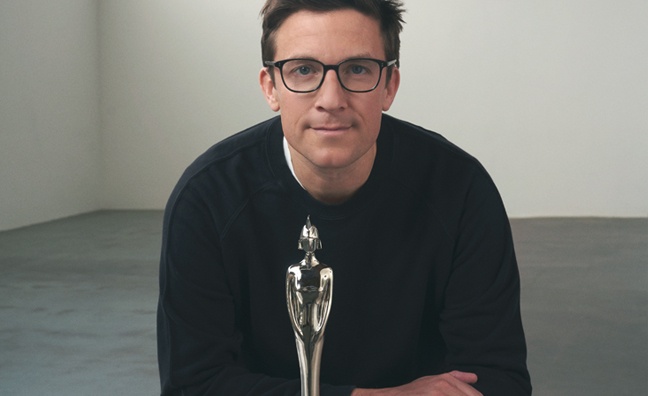With The BRITs set to return for 2022 in just a matter of days, Music Week sits down with showrunner Tom March to find out why, this year, the legendary awards show will be better than ever. Here, in a brand new digital cover story, the Polydor co-president talks big changes, big performances and his hopes for big success…
WORDS: JAMES HANLEY PHOTOS: LEO CACKETT
The 2010 BRIT Awards will always hold a special place in Tom March’s heart. Professionally, because Florence + The Machine (who the then Island Records exec helped break globally) picked up Best British Album for the acclaimed debut, Lungs. And personally, because it was the night his mum finally cottoned on to what he did for a living.
“She saw me on TV that year and called to ask why I was there. And I said, ‘Because I work in music mum!’” chuckles March. “I think she’d always thought ‘working in music’ meant I worked at HMV or something and I’d never really been able to explain it to her. So after she’d seen me on TV, I told her, ‘I actually work with some of those artists,’ and I think that’s when she realised I maybe had something going on.”
The now Polydor co-president has a lot going on in 2022 as showrunner for this year’s ceremony, which returns to The O2 in London on Tuesday, February 8. Comedian Mo Gilligan is in line to host, coming in after Jack Whitehall stepped down after a four-year stint, with Clara Amfo and Maya Jama presenting from the red carpet. Completing Universal Music UK’s three-year tenure at the BRITs helm, March takes up the baton from EMI president Rebecca Allen and Universal Music EVP Selina Webb, who overcame a myriad of challenges to deliver the delayed 2021 awards last May.
The well-received show, staged as part of the government’s Events Research Programme, welcomed a 4,000-strong audience, comprised mostly of key workers, as performers such as Dua Lipa, Olivia Rodrigo, Elton John and Years & Years (pre-recorded), Arlo Parks, Headie One, AJ Tracey, Young T & Bugsey, Griff and Rag’N’Bone Man gave a reminder of what the world had been missing over the previous 14 months.
“Becky and Selina did a remarkable job to put on something of that scale, when the country had been shut down for so long just before it, because I know how much planning goes into these things,” beams March. “To even attempt to put that show on like they did was remarkable. I thought it was brilliant.”
No sooner had the dust settled than March was fielding a call from Universal Music UK chairman David Joseph, organiser of the 2020 event, about chairing the BRITs committee for 2022.
“It was pretty much straight after the last event, bearing in mind that was in May and this year’s is happening at the beginning of February, so it's not even a full year between BRITs,” recalls March. “David called me and said he’d love me to do it, I think he knows how much I love the BRITs and I immediately said yes. But then I was like, ‘Oh shit!’ It’s a massive honour, but when it actually dawns on you that you're overseeing proceedings, you want to make sure you put on a great show.”
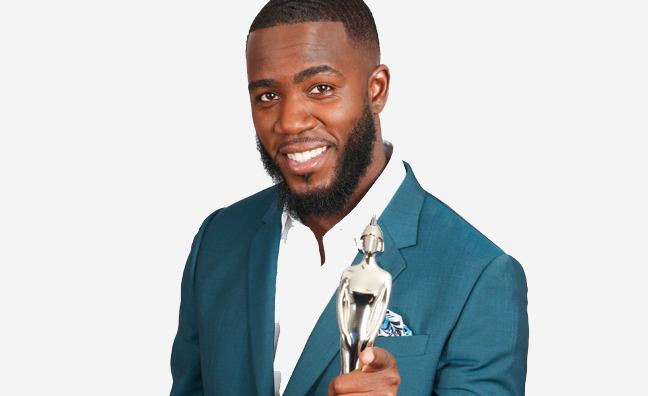
BRITs 2022 host Mo Gilligan
Proceedings will be broadcast on ITV and ITV Hub and streamed live on the BRITs YouTube channel for viewers outside the UK, while artists set to perform on the night include Adele, Dave, Ed Sheeran, Sam Fender, Liam Gallagher, Little Simz and BRITs Rising Star winner Holly Humberstone.
While Coldplay kicked off the 2021 BRITs by playing live from a pontoon on the River Thames, and international stars The Weeknd and Pink appeared virtually due to travel restrictions, this year’s performers will all be present at The O2 in person.
“It's important that the BRITs continues to have the biggest stars in the world in the room,” March says. “It's the biggest night in British music and it’s a real honour to perform on that BRITs stage, it's the pinnacle of a lot of artists' careers. So I like the energy of keeping everything in the room rather than cut to VT stuff, because we don't have to do that this year.”
The BRITs committee is implementing a series of changes under March’s leadership. The gender-based categories have been removed, while four new genre awards – Alternative/Rock Act, Hip-Hop/Grime/Rap Act, Dance Act and Pop/R&B Act – have been introduced, with each to be decided by a public vote. Song Of The Year (renamed from Best British Single) will include featured artists for the first time. Honorary Producer Of The Year and Songwriter Of The Year awards will also be handed out by the BRITs Committee, with Little Simz and Michael Kiwanuka collaborator Inflo already confirmed as winner of the former.
“Hopefully, some of the changes we have made this year will stand the test of time,” says March. “When you get the chance to run something like the BRITs, there's loads you want to do and you can't do all of it because it's just not possible. But you can hopefully try and keep moving things forward.”
The set design is changing too, with Block9 installed as the BRITs’ new creative team.
“I love what they did with Banksy's Dismaland and the Live At Worthy Farm stream last year, and I've spent many hours lost in their sets at Glastonbury,” March says. “The BRITs will look like it's never looked before. I've had a sneak peek at some of the sets and it's going to be spectacular. I could not be more excited.”
Much of the media’s attention has focused on the decision to drop the BRITs’ gender-based awards categories in 2022. Instead of the four male and female awards for UK and international acts, the BRITs will move forward with two categories: Artist Of The Year and International Artist Of The Year. The switch followed criticism from three-time BRIT Award winner Sam Smith, who came out as non-binary in 2019, excluding them from the gendered categories.
"I look forward to a time where awards shows can be reflective of the society we live in,” Smith wrote on social media. “Let’s celebrate everybody, regardless of gender, race, age, ability, sexuality and class."
Perhaps inevitably, the move – which brings the BRITs in line with other big music ceremonies including the Grammys and the MTV VMAs – attracted a degree of criticism. Culture secretary Nadine Dorries called it a “sad decision”, adding: “I would like to see how that would work in terms of fair gender representation”.
While addressing that, March also opens up on his personal BRITs history, what the event means to the business and shares his vision for the awards in this in-depth one-to-one with Music Week…

Why was it important to drop the gendered categories for 2022?
“It always felt right to me, culturally, to move to Artist Of The Year. I like the idea of creating the biggest award and accolade possible – and Artist Of The Year has that gravitas. We spoke about it in the first committee meeting and it was unanimously agreed that it was the right time. It was important that it didn't mean fewer opportunities for artists – particularly female artists – to be nominated or to win awards. Eight of the 11 winners last year were female, so I was confident that by moving to Artist Of The Year, it wouldn't reduce the chance for female artists – especially because adding the four genre awards would hopefully create, and did create, more opportunities for more artists to be nominated. Also, it brings the BRITs in line with the Grammys, which made the change eight years ago, along with the MTV awards, the ARIAS and other big music awards globally. And we have the most female nominees we’ve had in the last 10 years.”
Did some of the comments made by non-binary artists play a part in that?
“Obviously we listened, and of course it [played a part]. But like I said, the first thing I did when I took over the BRITs was to listen to everyone – from fans to artists – so everyone's views and thoughts came together for us to believe that this was the right time to do it.”
Did you foresee some of the criticism that came your way?
“We knew it was a decision that maybe not everyone would agree with, and that's OK. But, as I said, the most important thing for me was making sure it didn't reduce opportunity. That’s why we added International Song Of The Year at the same time. By adding five more awards, I felt that created more opportunity. There is of course more work to be done as an industry overall and the BRITs will continue to listen and evolve.”
Given the figures you mentioned regarding female nominations, how much progress do you feel the BRITs has made on gender equality?
“I was delighted to see the number of nominations, but I wasn't surprised because look how many spectacular albums have been made by female artists. My favourite album of last year is probably the Self Esteem record. The Little Simz album is a masterpiece. Adele's album has conquered all before it. But as an industry, we know we've got lots more work to do – not just in terms of artists, but also in terms of executives. I've been really encouraged by the work [director of diversity and inclusion] Natasha Mann is doing at Universal. Universal is doing some great work in that space and I'm sure there's equally brilliant things going on across the industry. We're not perfect, but hopefully we're moving in the right direction.”
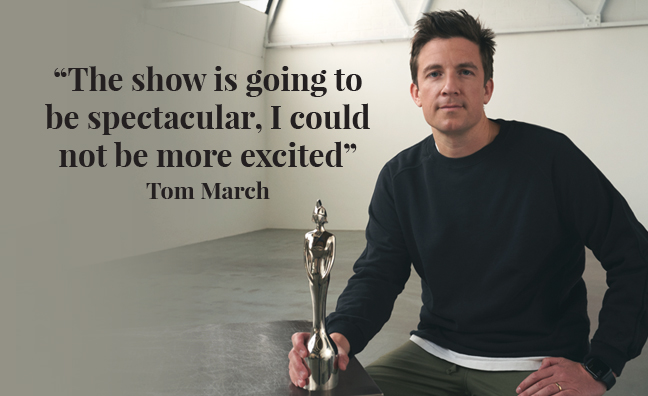
Featured artists are also included in the Song Of The Year category for the first time. What was the thinking there?
“We're in the age of collaboration. I work with so many artists and I know how much hard work they put into a record. If they're a featured artist, they work just as hard as the artists they're working with, so it just didn't feel right to me that artists that feature or collaborate on a record aren't nominated. That was quite an easy decision.”
This year’s changes are the latest in a long history of BRITs evolution, but what are your earliest memories of the show?
“Classic moments from the ’90s that really stick in the memory, like the Spice Girls, Oasis and Blur, Jarvis Cocker and all that chaos. As a kid, I just loved watching the madness unfold in the room and the frantic energy. It just felt incredibly exciting and I was always rooting for my favourite artists to win.”
The BRITs became synonymous with controversy in that era, of course. As showrunner, do you secretly hope for a bit of mischief, or do you just want everything to go as smoothly as possible?
“We always love a little bit of chaos, don’t we? Chaos is exciting!”
What have been your personal BRITs highlights down the years?
“I've been involved in some great moments. Florence and Dizzee Rascal was a proper moment [the pair famously duetted on You Got The Dirtee Love at the 2010 awards]. We released it and it went to No.2 in the charts. That was a really proud moment for me because I'd been working with Florence from the very beginning, from her first ever 7" to winning Best British Album at the BRITs, so it really meant something to me to go on that journey. But I've had lots of brilliant moments; I think the first year I went was when Mika won Best Breakthrough Act [2008].”
From your experience, what does it take to run the awards?
“You need to be able to calmly navigate constant curveballs being thrown at you. You've got to be able to work with the industry well, you've got to be fair and you've got to listen.”
So, how have you managed do this and be Polydor co-president at the same time?
“I've been able to do it because the team at Polydor are the best in the business, genuinely; we have phenomenal people and that's why we are where we are as a label. Generally, I've removed everything else from my life and just worked on Polydor and the BRITs, so it's been non-stop, but it's actually been fine to do both together. It's not been a problem.”
How soon after the 2021 event did work begin on this year’s show?
“Within the first week of me taking over, I did some market research and spoke to people across different age demographics: fans of the BRITs, lapsed fans and people who don't engage with it, to get a real feel for what the audience wants and where we needed to take the show. Luckily, a lot of what was being said was where my head was at already [in terms of] what I'd thought about changing and adapting. That first weekend, I started writing down thoughts for the host – knowing that Jack was moving on – and Mo was literally the first name on my list.”
Given the ongoing uncertainty around restrictions, was a virtual or hybrid event ever a possibility?
“No, because when we started planning, it was pre-Omicron and restrictions had fallen away and we planned to have a return to the BRITs of the past in lots of ways. Clearly, with the onset of Omicron in December, that changed things. And with the Grammys saying they were [postponing], we had a few conversations about whether it was right to move forward. We’ve had to adapt some elements of the show to make sure it's as safe as possible for artists.”
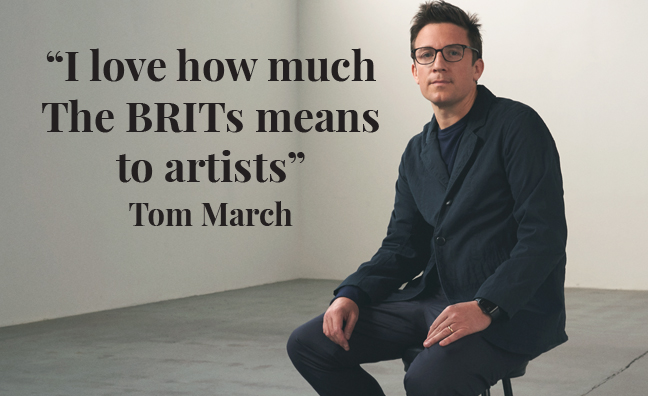
The BRITs was held in May rather than February last year, for obvious reasons. Was any consideration given to sticking with a later date?
“We're reflecting on the last year, so it should come close to the end of the last year. Post-BRITs, our focus moves on to everything we're doing this year. But February feels like the BRITs' home, it feels right.”
How important is it to the industry that the BRITs happen?
“We were sold out before the line-up was announced – everyone wanted it to go ahead. Hopefully, the BRITs come at a time when labels are going back into the office and we're all going to be together again. It's been a tough start to the year in terms of live and it remains that way, but hopefully the BRITs kickstarts things. We'll be able to be back out at shows and move into what should be a phenomenal festival season. We're blessed with a great line-up of artists because there have been some spectacular albums. It should be such an exciting celebration of a broad spectrum of British talent.”
What do you think the line-up says about the state of British music?
“We've got some unbelievable artists, just look at the shortlists. That was one of the reasons I wanted to add genre awards. Nominations help artists' careers, so bringing in genre awards helps genres that have maybe been overlooked. It also means more emerging artists can get a chance to be nominated. Despite the challenges that artists and their teams have faced, we've probably had one of the best years in British music for quite some time – and the BRITs will celebrate that.”
The 2021 campaign saw record-breaking numbers. Do people underestimate the power of the BRITs as a star-making opportunity on an international scale?
“Artists have iconic moments at the BRITs – Dave's performance a couple of years ago was so powerful, one of the best performances I've ever seen. And who can forget Adele under that spotlight in the middle of the room with Someone Like You? It blew everyone away. Olivia Rodrigo performing Drivers License in that room last year was probably her first big global performance. It connected an artist to a song and 15 million people watched that on YouTube the next day. Everyone wants to perform on that BRITs stage and make it one of the biggest and best moments of their career. I love how much it means to artists and hopefully it continues to be a remarkable platform for them for many years to come.”
Holly Humberstone was named winner of the BRITs Rising Star in December, what impact have you seen from that so far?
"The impact starts now. I believe she is one of the best new artists in the world. The BRITs is going to be a huge moment for her and for millions more people to discover her and her brilliant music. I couldn't be happier and proud that she's just got this moment. She's very excited and a bit nervous, but that's OK."
It's an award that has created quite a legacy, how important is it for breaking artists?
"In my career I've always put huge importance on trying to win that [Rising Star] award, I think I've won it six times with various artists over the years and I've seen the impact that it has, what it means and how it resonates globally. And also, what it can do to break an artist here in the UK. That award has been voted for by the most important music critics in the country and those people are going to help you grow through your career over the coming years and months. I know how important that was even recently with an artist with Celeste, and I know it's going to be the same for Holly. And I couldn't be prouder to see another recent Rising Star winner Sam Fender take the stage at the BRITs. Hopefully that will be the same for Holly in a couple of years' time."
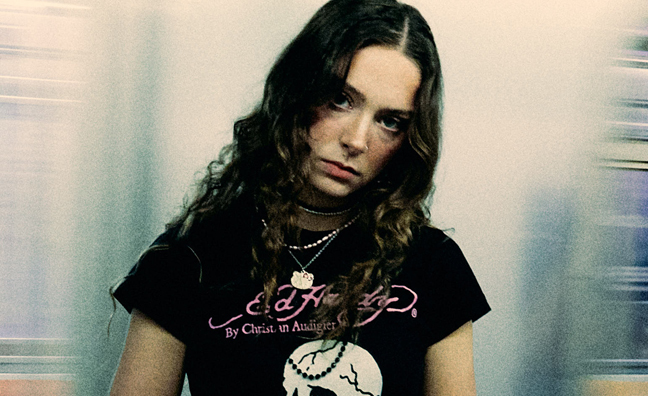
BRITs 2022 Rising Star winner Holly Humberstone
How will you gauge the success of this year’s event?
“It's about the global audience – are people talking about the show on a global level? Are we a huge part of the conversation? ITV is a phenomenal supporter and partner for the BRITs and the TV show will be spectacular, but it’s about how many people engage on all platforms, whether it be YouTube, TikTok, Snapchat, Twitter… We've got an amazing activation lined up with a huge gaming platform as well that I can't announce yet, but is a massive global first for the BRITs. That is how I will judge success.”
In what ways should the BRITs evolve next?
“Well, I'd love to see the BRITs happen at the weekend. Unfortunately, the Tuesday night was already locked in when I took over. It was important to me to bring back The BRITs Are Coming launch show on TV, so it has that big TV moment, but I'd love a Saturday or Sunday night primetime slot for the BRITs. But the BRITs could easily evolve in the future. Does it stay as one night or does it run across a week or something? I don't know. The BRITs could evolve, but who knows where the show will go in the future.”
What mark do you hope to leave on the event?
“I'm excited to have brought back Producer Of The Year; Inflo is a remarkable talent and is thoroughly deserving of the award. I couldn't be more excited to have brought in Songwriter Of The Year for the first time, so that's going to be a big award on the night and I hope that stays for many years to come. I’ve also brought in International Song Of The Year for the first time, so I think we've made a few positive changes and hopefully they're well received and the BRITs continues to move forward as the most important music show of the year.”
Who would you give a BRIT to this year as a thank you?
“[Executive producer] Sally Wood, 100%. It's her last BRITs; she's done the last eight years and is a force of nature. The BRITs would not happen without her, although it has to happen without her next year because she's got a brilliant new job at the BBC! I'm told I actually get a BRIT Award for myself, which I'm very excited about because I was never going to get one for my singing!”
And where will you keep that – at home or in the office?
“I’ll give it to my mum!”
